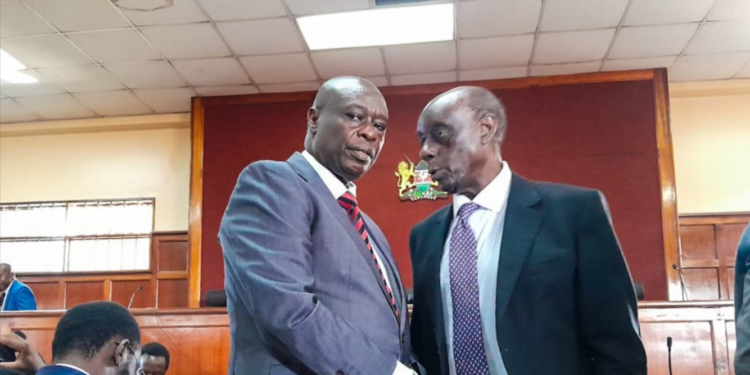In a courtroom packed with anticipation, the ongoing legal tussle surrounding the impeachment of Deputy President Rigathi Gachagua took a new twist as petitioners challenged the constitution of the three-judge bench.
The hearing, meant to deliberate on the conservatory orders that halted Gachagua’s impeachment, saw the petitioners question the integrity of the judicial process, accusing the Chief Justice of overstepping constitutional mandates.
Kibe Mungai, representing Gachagua, opened with a statement asserting that the conservatory orders, which temporarily halted the impeachment process, were the only valid files before the court. Mungai emphasized the importance of transparency in judicial processes, stating that the “wananchi” (citizens) deserve clarity and that the court should consolidate all related cases for the sake of order and transparency.
“For the sake of good order, why would it be difficult for this bench to schedule all cases that deal with the same subject matter on a specific day, ensuring that all parties are notified?” Mungai asked. He went on to argue that the issues raised against the Deputy Chief Justice should be formally addressed in court, ensuring that all parties are heard and the judicial process is transparent.
One of the petitioners’ key grievances was the timing of the conservatory orders issued by the Deputy Chief Justice Philomena Mwilu. Mungai questioned the legality of a bench convening on a Saturday to issue the orders, suggesting that this was irregular. “On what basis would an application by the executive be convened on a Saturday?” he asked, further asserting that the Chief Justice’s power to appoint a bench is substantive, not administrative, and cannot be delegated to the Deputy Chief Justice.
Ndegwa Njiru, another lawyer representing Gachagua, echoed Mungai’s sentiments, arguing that the delegation of powers by the Chief Justice to the Deputy Chief Justice was unconstitutional. “The reason we find ourselves in this situation is that the court is struggling to explain why three files have been graciously generated, while other consolidated files lack justification,” Njiru stated. He accused the court of discrimination, suggesting that the petitioners’ files had not been prioritized.
Veteran lawyer Paul Muite also weighed in, highlighting the urgency of the matter and the broader implications of the case. “We’re not just dealing with the removal of the Deputy President; we are also addressing the potential removal of future Presidents,” Muite said, framing the case as one of national importance. He questioned how the orders in the Kerugoya case were issued so swiftly, suggesting that the Deputy Chief Justice had convened a bench under questionable circumstances.
However, the bench, led by Justices Eric Ogola and Chacha Mwita, pushed back against the petitioners’ arguments. Justice Ogola reminded the court that the judicial system now operates under the new constitution and an e-filing system, allowing cases to be addressed at any time, including weekends. “When you argue the way Mr. Mungai has argued, that court sat on Saturday, you know that we work online, and most of you know that matters reach us at any time,” Ogola said, dismissing claims of irregularity.
Justice Mrima, who was also on the bench, clarified that the three matters before the court were not solely due to the issuance of conservatory orders but because subsequent applications had been filed online after the empanelment of the bench. “These applications were filed after the empanelment and were submitted online. It is solely on the basis of these applications that we are here today,” Mrima said.
Representing the National Assembly, Paul Nyamodi criticized the petitioners for dramatizing the issue in court when they had already addressed it by writing to the Chief Justice. “If that is the avenue they have chosen, then let them deal with it by way of the letter,” Nyamodi said, implying that the petitioners were using the court as a platform to sensationalize the issue rather than following due process.
Former Attorney General Githu Muigai, also representing the National Assembly, dismissed the petitioners’ claims regarding the Deputy Chief Justice’s role, stating, “If the Deputy Chief Justice cannot assign duties to judges, what exactly does the Deputy Chief Justice deputize?”
Another heated moment occurred when Tom Ojienda, representing the National Assembly, referred to an internal memo from the Chief Justice’s office, which he claimed to have accessed from the court’s portal. Elisha Ongoya, representing Gachagua, challenged the authenticity of the document, pointing out that it lacked a clear timestamp. “The document does not have a clear timestamp. We just need to know where it is so that we can authenticate it,” Ongoya said, accusing the respondents of attempting to demean the petitioners.
As the hearing progressed, it became clear that the case was not just about the impeachment of Deputy President Gachagua but about the integrity of the judicial process and the balance of power within Kenya’s political landscape. The petitioners’ focus on constitutional violations and judicial overreach framed the case as a battle for Kenya’s democratic stability, while the respondents sought to downplay these claims as mere theatrics.
The court is set to deliver its determination on the new case tomorrow at 3pm.


















